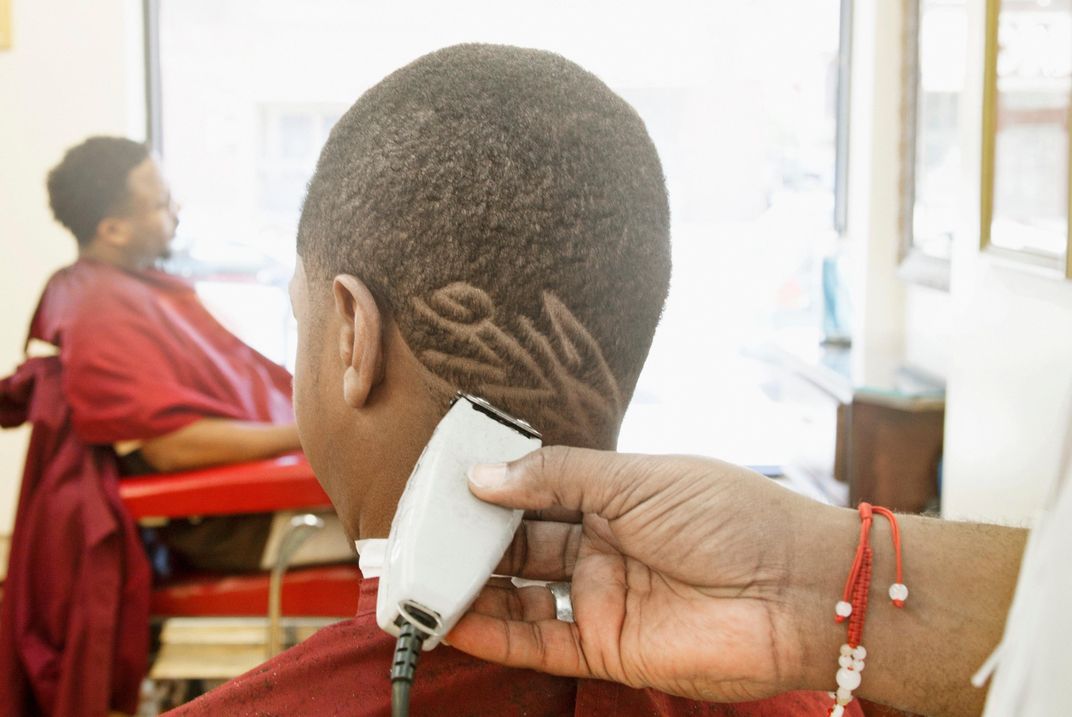Barbers Are Giving Buzz Cuts to Detroit’s Overgrown Lots
A new project funded by a Knight Cities grant has local barbers and landscape contractors working to revitalize vacant spaces
/https://tf-cmsv2-smithsonianmag-media.s3.amazonaws.com/filer/66/df/66df8b23-e0bf-4f47-a41a-ed3f4a193470/6290092794_e696e59c17_o.jpg)
Have you ever wondered what a mohawk would look like on a park lawn? Or what about a shrub trimmed in the style of a trendy undercut?
With more than 90,000 vacant lots, many of which are overgrown and dilapidated, Detroit currently has a massive surplus of underutilized space. Erin Kelly, a program manager at Detroit Future City, an urban planning initiative, is raising awareness about this issue as well as creatively addressing it by pairing Detroit's barbers and landscape contractors. Together, they might be able to do some interesting pruning.
Kelly's project, aptly named "The Buzz," is one of 32 projects (five of which are in Detroit) to be funded by the first annual Knight Cities Challenge. The challenge allocated more than $5 million to different works promoting local civic development, and "The Buzz" received $84,055 in grant money.

Just as a fresh haircut can uplift a person, Kelly hopes her initative can energize Detroit as it continues to recover since declaring bankruptcy in 2013. "Sometimes when things aren't going well, you can't afford a new outfit or new car, but most people have access to a haircut," she says. "This could be a way to bring that to Detroit neighborhoods."
The grant will help fund several workshops that introduce local barbers and landscape contractors and ask them to learn about their counterparts' skills and collaborate. The first workshop involves members of each profession showcasing their expertise. In the second, the two swap mediums, and the third and fourth focus on team-based brainstorming and execution. Their final projects will be presented to the broader community in a final "vacant lot mowing pageant" in September and a series of videos documenting the entire process.
"A barbershop is a place of conversation, exchange and dialogue," says Kelly, inspired by her local shops. "In Detroit, because we are about 85 percent African-American in our population, there is a larger culture around hair. True barbery is a form of design."
In 1991, David Humphries started "Hair Wars" in Detroit, an event highlighting creative and experimental styles that would go on to become one of the largest black hair shows in the country. "All the new trends start here. Everybody across the country copies Detroit hairdos,” Humphries told the Detroit Metro Times in 2004. In the same article, Regina Kimball, director of the documentary My Nappy Roots, added, "Just like you think of Paris and Milan as the nucleuses of high fashion, Detroit definitely has become the nucleus of black hair."
Dorothy Grigsby, the owner and operator of Shep's, one of the oldest barbershops in Detroit, notes that her shop has aimed to stay on top of current trends while consistently serving generations of regulars. "The barbers are like artists—they have a vision and customize it to make it appealing to that particular person," she says. Grigsby thinks the meticulous and creative nature of their work is directly transferrable to the manicuring of lawns and shrubs. "Those design ethics will carry right over," she says.

With help from development organizations in the southwest and east sides of the city, Kelly and her team are now recruiting participants for the project and identifying vacant lots across neighborhoods in need of a trim. The group also aims to develop a larger plan for managing vacant land and maintaining these spaces.
Kelly sees this effort as a chance to transform the role of landscape design within cities—by infusing the spirit of a city into these lots. "Everything I've seen on pattern-making and forms related to mowing has come from ecologists," she says. "This partnership could be used to introduce a sense of localness and neighborhood-based expression."
Kelly, who has a degree in landscape architecture from the Harvard Graduate School of Design, has previously worked with design in large civic parks, tested partial deconstruction of abandoned buildings in Detroit (a means of tearing down structures while conserving materials), and spearheaded the Patch vacant lot contest, which challenged residents to clean up abandoned areas in their neighborhoods in order to win funding to maintain those sites.
Nina Bassuk, a professor and program leader of the Urban Horticulture Institute at Cornell University, sees this effort as an intriguing one, but notes the fundamental importance of site preparation and maintenance to effectively transform these vacant lots long-term. "There is much clean up and soil preparation that will need to take place before the aesthetics of design will weigh in," she says. "I think that anyone who is interested in working on revitalizing vacant lots can make a significant improvement."
The quirky project should get more people talking about capitalizing on vacant spaces. "Land is one of the biggest potential liabilities in Detroit, but it’s also one of our biggest potential assets," says Kelly.
Additionally, the venture is about connecting and using the talents of different members of the Detroit community to address a common problem. The daunting goal of rebuilding the city hinges on the collective energies and focus of its citizens, requiring efforts beyond the bounds of city government. "People need to take ownership of the landscape," says Bassuk.
"It’s going to take everyone to understand how we better manage our land in Detroit," says Kelly. "We aim to showcase the talent and the ideas that already exist in Detroit that don’t require importing someone from New York to give us an answer—ideas that are not exclusively developed by the municipal planning commission."
This initiative is one of several fresh tacts taken to address some of the overwhelming civic challenges in Detroit. "In order to keep up with the new trends," says Grigsby, who has kept Shep's in business since 1944, "you have to be able to change."
/https://tf-cmsv2-smithsonianmag-media.s3.amazonaws.com/accounts/headshot/profile.jpg)
/https://tf-cmsv2-smithsonianmag-media.s3.amazonaws.com/accounts/headshot/profile.jpg)